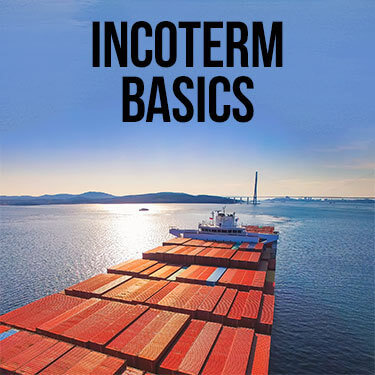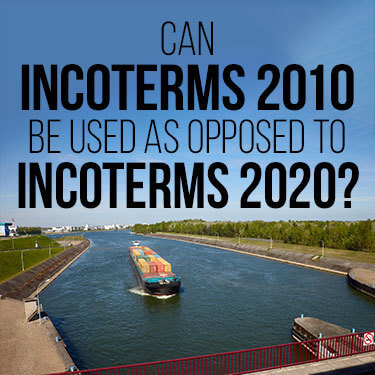Knowing what the best Incoterms® for importers are is helpful when you’re trying to reach an agreement with an international seller. Numerous things can go wrong when goods are shipped internationally. Whether the goods are damaged or the seller tries to scam you, you must protect yourself financially.
The best Incoterms® for importers that will provide the necessary protection and benefits when conducting an international transaction are:
In this article, we’ll elaborate on why these are the best Incoterms® for importers and why you should use them.

Before getting into which Incoterms® are the best ones for importers to use, you should know what Incoterms® are in the first place in case you’re unfamiliar with them. Incoterms® were published by the International Chamber of Commerce (ICC) as a means for international buyers and sellers to better understand one another’s responsibilities when shipping goods.
There are 11 different types of Incoterms® and each of them are able to be used by any buyers or sellers operating out of any country in the world. Our article on the 11 types of Incoterms® covers each of these Incoterms®, their categories, and what modes of transport they apply to. If you need further assistance with understanding any Incoterms®, our licensed customs brokers will be able to help.
When looking through each of the Incoterms®, you’ll likely find no mention of an importer or exporter. That’s because importers aren’t always the buyers of international goods. Other entities may purchase the goods and rely on someone else to import them into the country.

Importers can face many challenges when they bring goods into the country. These challenges can be overwhelming, especially if you’ve never imported before. Fortunately, these Incoterms® place some important responsibilities on the seller, making the shipping process much easier for the importer.
Under the FOB Incoterm®, the seller (exporter) will take care of a few important responsibilities. For one, they’ll take care of all the customs duties of their home country. It serves as a perfect middle-ground for importers by allowing them full control of the transportation process and local customs.
This is beneficial for importers that are not familiar with the customs laws of the country their goods are coming from.
The DAT, DAP and DDP Incoterms® are very useful if you’re an importer who has never imported goods or has little experience. Under these Incoterms®, the exporter is responsible for most of the shipment. This includes handling their country’s customs responsibilities and picking a carrier to transport the goods to the importer’s country.
These Incoterms® will require the buyer to handle the customs responsibilities of their own country. The great part about this is that you won’t have to worry about the foreign seller possibly making a mistake during this process. It also allows buyer to act as the importer, which gives them greater control over the customs process.
Understanding U.S. import regulations might be difficult for a U.S. citizen, but they can be even more complicated for a foreign seller. If you do have trouble figuring out the customs responsibilities for your shipment when using one of these Incoterms®, schedule a consulting session with USA Customs Clearance so we can help you out.
These two Incoterms® split the responsibilities between the buyer and seller right down the middle. Typically, buyers and sellers who have established a strong level of trust from previous international transactions will use these two Incoterms®.
Under these Incoterms®, the seller is only responsible for the shipment until it arrives at the port of destination. After that point, the buyer takes over responsibility for the shipment.
However, where they differ is in regards to insurance responsibilities. The CIF Incoterms® dictates that the seller has to insure the goods. This detail makes CIF Incoterms® more favorable because the seller is spending the money to protect your shipment from the various costs and risks that occur when conducting international trade.
Like with the FOB Incoterms®, these two Incoterms® are only applicable when sea, ocean or inland waterways are used to deliver the goods. For more information on import/export insurance, check out our article about the topic.
To summarize the amount of responsibility an importer will have over their shipment, we’ve used the table below to give a visual representation.
| Incoterm® | Percentage Of Control |
| FOB | 60% |
| DAT/DPU | 20% |
| DAP | 10% |
| DDP | 5% |
| CFR | 50% |
| CIF | 50% |
Want to more about how to use Incoterms®? Check out our article for an easy rundown.

Incoterms® 2010 and 2020 can both be used by buyers and sellers conducting global trade with one another. The only stipulation is that both parties have to agree to the same Incoterms® from the corresponding edition. For the most part, the Incoterm®s we discussed do not differ greatly from either of these two.
The 2020 Incoterms® edition does make a slight change to the DAT Incoterms®. In the 2020 edition, these Incoterms® are Delivered at Placed Unloaded or DPU. This version of the Incoterms® is slightly more beneficial to the buyer than the 2010 DAT Incoterms.
Unlike the DAT Incoterms®, DPU gives the buyer the option to pick other drop-off points other than a terminal. Other than this added flexibility, the 2020 DPU Incoterms® is the same as the 2010 DAT Incoterms.
Regardless of what Incoterms® you and the seller agree on, there will be at least one type of import responsibility that you will have to be accountable for. At USA Customs Clearance, our team of licensed customs brokers can help guide you along through any responsibility that you have to handle.
We can also provide importers with a continuous customs bond. With this bond, you will be able to import any amount of goods you want for an entire year. Reach out to us today so you can start importing with confidence.

Our 45 Minute Licensed Expert Consulting Will Personally Guide You.
 Copy URL to Clipboard
Copy URL to Clipboard
Add your first comment to this post